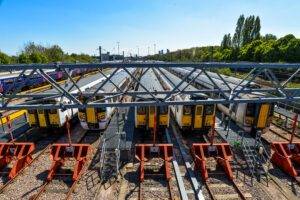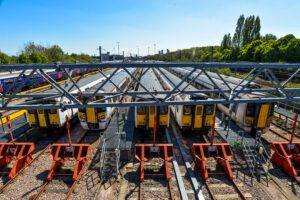
Rail passengers in Dorset and Devon are facing extended journey times and reduced services after extreme dry weather caused embankments to shrink and destabilise sections of railway track.
South Western Railway (SWR) confirmed it has had to introduce speed restrictions and a reduced timetable on its route between London Waterloo and Exeter, following the sunniest spring in more than 100 years and the second driest spring in England since 1976.
The lack of moisture has caused soil embankments to contract, particularly along a 12-mile stretch between Gillingham and Axminster, leading to structural movement beneath the tracks. As a result, trains are now limited to 40mph instead of 85mph on affected sections, extending journey times by up to an hour.
SWR said the speed restrictions on this single-track line mean trains can no longer pass each other at scheduled times, forcing a cut in services.
“We are very sorry for the disruption that customers will experience due to this change, as we know just how important the west of England line is to the communities it serves,” said Stuart Meek, SWR’s Chief Operating Officer.
“To continue operating a safe and reliable service, we have no alternative but to introduce a reduced timetable.”
Network Rail, which manages the railway infrastructure, said the dry conditions posed a safety risk and confirmed that speed restrictions would remain until the embankments stabilise.
“The safety of our customers is our number one priority, which is why we must impose these speed restrictions,” said Tom Desmond, Operations Director at Network Rail.
“We will regularly review conditions in order to restore the normal timetable as soon as possible.”
The disruption is the latest example of how climate change is impacting UK transport infrastructure. In recent years, both extreme heat and excessive rainfall have triggered emergency engineering works, service cuts, and speed limits on several lines across the country.
In summer, rails can buckle under prolonged heatwaves, while saturated embankments in winter can collapse or slide due to poor drainage. Last year, Network Rail reduced services in Kent after record wet weather weakened earthworks and waterlogged the ground beneath the tracks.
In response to increasingly volatile weather patterns, Network Rail has committed nearly £3 billion in funding between 2024 and 2029 to address climate-related risks across the network. The funding includes increased investment in maintaining and reinforcing embankments, cuttings, and drainage systems.
This follows previous enhancements made in the wake of the Stonehaven disaster in Scotland, where a 2020 derailment caused by a landslip led to the deaths of three people and sparked a major overhaul of how the railway responds to extreme weather.
As the climate continues to change, operators and infrastructure managers face growing pressure to invest in long-term climate resilience to safeguard transport links and minimise disruption to businesses, commuters and rural communities.
Read more:
Rail services cut in southern England as dry weather disturbs track stability








